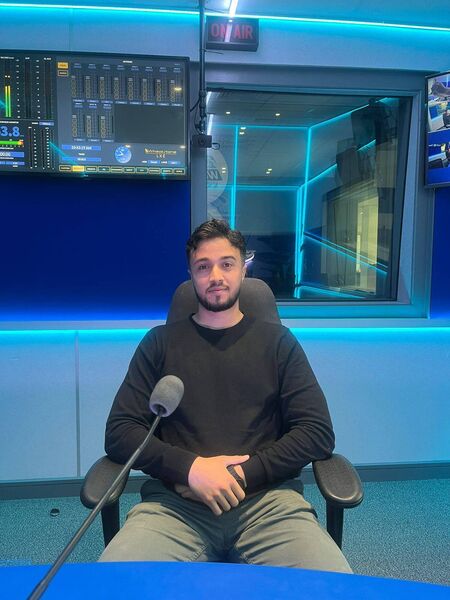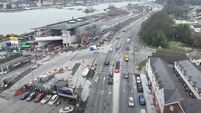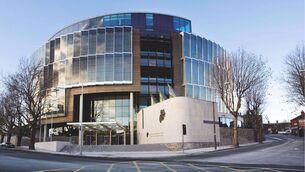UHW doctor saves lives in Waterford while powerless to save his own family in Gaza

Dr Momin Hilles outside the A&E Department at UHW.
In the corridors of University Hospital Waterford, Dr. Momin Hilles goes about his shift with focus and urgency, attending to everything from sporting injuries after local hurling matches to road traffic accidents and medical emergencies.
Since arriving in Waterford in February 2024, the 29-year-old doctor has become a valued member of the hospital’s Emergency Department team, known for his steady hand and compassionate care.
What many patients and colleagues may not know is that Momin’s journey to Ireland came at an extraordinary cost – financial, emotional, and personal. He is from Gaza, and was offered this position in University Hospital Waterford shortly after this current genocide began.
It cost $8,500 for him to escape. And today, while he works tirelessly to care for people in Waterford and across the southeast of Ireland, he carries the weight of unimaginable grief, fear, and loss.
“I feel very supported by the people I work with,” he says. “It is their support, and the passion I have for my job, that gets me through each day – because my parents and seven sisters are still in Gaza and I have no way to help them.”
Momin arrived in Waterford in early 2024 after securing a position in the emergency department at UHW. With the help of a fundraising campaign set up by a friend of his in the UK, Momin was able to pay the exit fee required by Israeli authorities to leave Gaza – a fee most Palestinians cannot afford, even if they are lucky enough to secure a job abroad.
His sister, a radiologist, also hoped to pursue work in Ireland but was unable to leave Gaza.
“The situation had become too dangerous by that time,” Momin says.
Back in Gaza, Momin’s family – his parents and seven sisters – remain displaced. Their home was destroyed in an airstrike. All basic infrastructure is gone: electricity, water, roads, and medicine. His mother requires urgent medical treatment she cannot access. His father has lost 40kg due to starvation – almost half his body weight.
Momin has lost more than 100 members of his extended family during this genocide – cousins, uncles, aunts etc.
“In Gaza today, everyone has lost someone,” he says. “Many have lost everyone.”
“I’m the only boy in my family. I grew up surrounded by my sisters, who are wonderful, kind, intelligent women. We had a normal, happy childhood,” he says.
“Now they are just trying to simply survive this unimaginable atrocity, and the only reason they are still alive is sheer luck.”
Momin’s story was recently shared on Déise Today with Damien Tiernan on WLR, on Newstalk with Sean Defoe, and on Beat 102 103 with Aoife Kearns. In each interview, he spoke clearly about what he had witnessed in Gaza and what he continues to learn through daily contact with his family.
The public response was immediate – messages of support from Waterford and across Ireland poured in. Listeners were struck by Momin’s sincerity, his humanity, and the dissonance between the man saving lives in Waterford and the devastation unfolding in his homeland.
Momin does not describe what is happening in Gaza as a war.
“It’s a genocide,” he says.
Since October 2023, Israel has imposed a total blockade on Gaza, cutting off food, water, fuel, medicine, and electricity.
62,000 people have been killed. Mass starvation is widespread.
“People aren’t dying just from bombs,” Momin explains. “They’re dying from preventable hunger and disease too.”
Even when limited aid is allowed in, accessing it is life-threatening.
“There have been many cases where people queuing for food were shot and killed,” he says.
“Some write goodbye letters to their families before going out to collect food because they don’t know if they’ll come back.”

He cites one particularly harrowing example relating to the Gaza Humanitarian Foundation (GHF), an organisation established in early 2025 by Israel to allegedly coordinate and distribute aid into Gaza.
“Since the GHF launched, not a single day has passed without mass killings of civilians waiting in line for food,” Momin says.
“People queue for hours, desperate, and unarmed, and they are shot.”
Independent investigations, including a June 2025 report from Al Jazeera, have confirmed that Israeli soldiers were ordered to shoot at unarmed civilians seeking aid, particularly at GHF distribution points.
Some survivors reported people being gunned down at close range as they waited for flour or rice.
Earlier this month, a group of United Nations human rights experts issued an urgent call for the immediate dismantling of the GHF, describing it as: “An utterly disturbing example of how humanitarian relief can be exploited for covert military and geopolitical agendas in serious breach of international law.” (Source: United Nations OHCHR, 13 August 2025)
They further noted that the GHF has become a mechanism for controlling and manipulating civilian movement under the guise of humanitarian assistance, creating deadly traps rather than safe lifelines.
“It’s not aid,” Momin says. “It’s entrapment.
"People are being killed just for trying to survive.”
While Gaza remains in the headlines, Momin fears that many people are becoming overwhelmed – numbed by the scale of devastation, paralysed by helplessness, and unsure of how to respond.
“People care deeply, but they feel powerless,” he says. “And when people feel powerless, they do nothing. That silence is just as dangerous.”
Momin is quick to point out that what is happening today did not begin on October 7, 2023.
“The world may just now be paying attention because of this current genocide, but Palestinians have been suffering since 1948,” he says.
Momin is 29 years old. He has lived through multiple Israeli military assaults – in 2000, 2008, 2012, 2014, 2021, and now this ongoing genocide since 2023.
“Each time, there is more displacement, more killing, more attempts to erase who we are,” he says.
Although media coverage often frames the crisis as an “Israel–Hamas war,” Momin urges people to look beyond that lens.
“If this is truly about Hamas,” he asks, “how do we explain what’s happening in the West Bank where Hamas has no control and no military presence?”
In the West Bank, occupation continues through daily land annexation, home demolitions, and the routine killing of civilians.
More than 320 Palestinian children under the age of 17 are currently being held in Israeli prisons, many without charge or trial.
One such case is Ahmed Manasra, who was arrested at the age of 13 and spent almost 10 years in prison, facing both physical and psychological abuse. When he was finally released earlier this year, his family was waiting at the gates of the prison to take him home, but the Israeli military instead abandoned him 50 kilometres away on deserted land.
Amnesty International has frequently pointed to Manasra’s case as a clear example of the systemic human rights violations experienced by Palestinian children in the Israeli military justice system.
“These stories aren’t the exception,” Momin says. “They’re the rule. So if it’s not about Hamas, then what is it about?”
He then answers his own question, “It’s about erasing an entire people.”
In Ireland, Momin has reached out to several TDs seeking help to evacuate his family to Jordan or Egypt – ideally with a path to Ireland, where his sisters, including a physiotherapist, radiologist and IT specialist, one of whom has already been offered a position in University Hospital Limerick, would qualify for Critical Skills Employment Permits and could immediately contribute to the Irish health system.
Before speaking on local, regional and national radio, only one office – that of Senator John Cummins – responded, and referred the matter to the Department of Foreign Affairs. No further contact has been received.
Requests to other representatives, including Mary Butler and Conor McGuinness, received no reply. However, following the radio interviews, Conor McGuinness replied offering to make a recommendation to the Department of Foreign Affairs on Momin’s behalf.
Momin also got a response from Tánaiste Micheál Martin’s office with a referral to Minister Simon Harris. No reply was received from Minister Harris’s office.
“I’m not asking for charity,” Momin says. “I’m asking for safety. For my family, and other families like mine, to have the same chance I was given – to live and work here in Ireland, to contribute in a meaningful way to society, and to have safety and dignity.”
Momin’s message to the Irish public is clear: donations, while generous, are not enough.
“Aid can’t reach people under blockade,” he says. “We are feeding a limited number of people scraps at night, only for them to be killed in the morning. What we need is political pressure now.”
He urges people to contact their TDs and Senators to call for an immediate and permanent ceasefire.
“Even just one message, one email, can help keep the pressure on. The silence is killing us.”
He also cautions that donations alone are not helping right now.
“Irish people are donating generously. But they need to know that aid is not reaching the people who need it.”
The blockade makes it almost impossible for food or medical supplies to get into Gaza.
“Even wealthy families, with money, can’t buy food or water. There’s nothing to buy. The money is useless.”
“Charities are doing their best, but what can they do if they can’t get access to the people who need their help?” he asks.
“In some cases, aid is hoarded or traded. And the families who are starving never see it.”
“This is not just a humanitarian crisis. It’s a political one. And if the violence and blockades don’t stop, the donations won’t change anything.”
Back in UHW, Momin returns to work. He treats patients with care and dedication. But behind each shift lies the knowledge that his family is still living under bombs, starvation and disease, without food or protection.
“This is not just a Palestinian story,” he says. “This is a human story. I’m a son, a brother, a doctor. I want what everyone wants – to work, to live in peace, and to keep my family safe.”
Even here in Ireland, Momin says the trauma follows him.
“When I hear a plane overhead, I still freeze,” he says. “That fear never fully leaves your body.” Momin’s courage in sharing his story has already touched many across Ireland. But he knows that goodwill alone is not enough.
“What’s happening in Gaza is not a conflict. It is not a war. It is a genocide,” he says. “And it will not end unless we demand that it does.”






